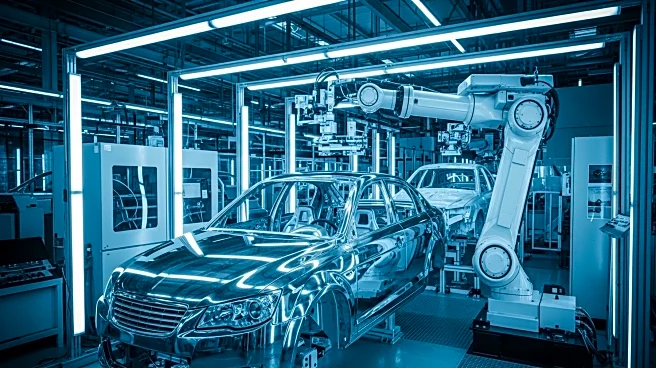What's Happening?
Stellantis, the parent company of Chrysler and Jeep, has unveiled a $13 billion investment plan aimed at revitalizing its U.S. manufacturing operations. This initiative, led by CEO Antonio Filosa, is set to create over 5,000 jobs and introduce new products across plants in Michigan, Illinois, Indiana, and Ohio by 2029. The investment includes the development of a midsize truck in Toledo, Ohio, two new Jeep models in Belvidere, Illinois, and a next-generation Dodge Durango SUV in Michigan. This announcement aligns with President Trump's efforts to boost U.S. manufacturing jobs through tariffs, particularly in the automotive sector.
Why It's Important?
Stellantis' substantial investment in U.S. manufacturing signifies a commitment to strengthening domestic production capabilities and job creation. This move is expected to bolster the automotive industry, providing economic benefits to regions with Stellantis plants. The investment could enhance the company's competitive edge in the U.S. market, particularly as it introduces new vehicle models. Additionally, the plan supports broader economic goals of increasing manufacturing jobs, aligning with government policies aimed at revitalizing the sector. The creation of 5,000 jobs will have a positive impact on local economies, contributing to economic growth and stability.
What's Next?
As Stellantis implements its investment plan, the company will focus on expanding its workforce and production capabilities. The introduction of new vehicle models will require strategic planning and collaboration with suppliers and partners. Stellantis may face challenges in adapting to evolving market demands and regulatory requirements, particularly in the context of electric vehicle production. The automotive industry will closely monitor Stellantis' progress, as successful execution of the investment plan could influence competitive dynamics and innovation in vehicle manufacturing.
Beyond the Headlines
Stellantis' investment plan may prompt discussions on the sustainability and environmental impact of increased automotive production. As the company introduces new models, including electric vehicles, there will be considerations regarding emissions and energy efficiency. The investment also highlights the role of multinational corporations in shaping U.S. manufacturing policies and economic strategies, potentially influencing future trade and labor agreements.











